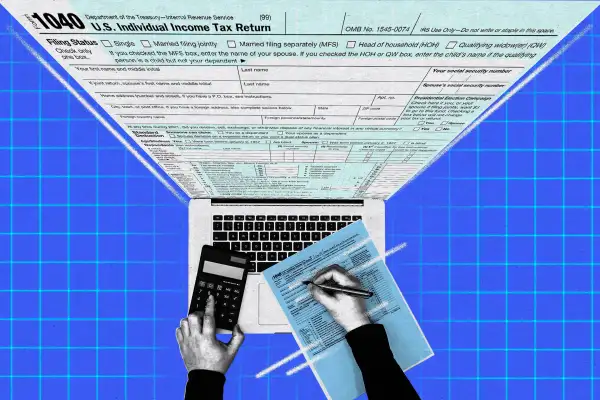The IRS Will Test Out Its Own Free Tax Prep Software in 2024

In just a couple years, you may be able to file your taxes online using free software created by Uncle Sam himself.
The IRS says that, on average, U.S. taxpayers spend $140 and eight hours filing their annual tax returns. To keep costs down and simplify the filing process, the agency announced Tuesday it is launching a pilot program next year to help some taxpayers file their returns for free online in a major step toward creating a free, government-run tax filing option for all Americans.
The agency is still ironing out the details of the pilot, but IRS Commissioner Danny Werfel told reporters on a call Tuesday that the public will be able to opt in, according to the Associated Press. He also stressed that the free government-run tax filing option is not intended to replace private-sector options like TurboTax or H&R Block.
“Taxpayers will always have choices for how they file their taxes,” Werfel said. “People should use the filing option that works best for them.”
Last year, the Inflation Reduction Act infused the IRS with $80 billion and a stipulation that the agency must study the feasibility of establishing a free, voluntary tax-filing system run by the federal government, known as “direct file.”
- Other countries have these sorts of tools, but in the U.S., the federal government only partners with some private tax companies to offer free guided tax preparation for some taxpayers through its "Free File" program.
- Free manually fillable forms are available to all taxpayers; however, to take advantage of guided prep through IRS Free File, there are certain income and state requirements.
- The current free filing program is not widely used, and the partner sites appear dated. Since 2003, roughly 70 million taxpayers have filed through the program. For context, throughout the 2022 filing season alone, the IRS has received over 140 million returns.
As part of the Free File agreement, the IRS initially agreed not to make its own free filing service, but that provision ended in 2019. Now the IRS is able to produce its own free software and allow taxpayers to file directly to the agency instead of through a third party. Hence the study.
- On Tuesday, the IRS delivered the results in the form of a massive 106-page report detailing how a direct file system would work as well as how taxpayers feel about a government-run tax-filing option.
- The report shows that “the IRS is technically capable of delivering Direct File, but that doing so would require additional resources and add complexity to IRS operations,” Werfel wrote in a letter to the U.S. Department of the Treasury.
- Depending on the exact features of the direct filing tool, the IRS says it could cost anywhere between $64 million and $249 million to operate annually. The earliest a bare-bones version of the tool could launch widely would be for tax year 2024 — the taxes most consumers will file in spring 2025.
What taxpayers want
In addition to surveying taxpayers about their opinions on a direct-filing system, the IRS separately conducted user-experience tests with a prototype.
- Overall, taxpayers were very receptive to a free, government-run tax filing option. A large majority of taxpayers, 72%, said they were either “very” or “somewhat” interested in a free, IRS-provided tool. Similarly, among those who use tax software, 68% said they were “very” or “somewhat” likely to switch to free IRS software.
- The IRS also interviewed 14 taxpayers who were able to try out a functioning prototype. At first, the IRS reports says that those people were skeptical of the functionality of the software, citing other clunky government-run websites. However, after using the software, they reported that it was simpler than they thought.
- One person told the IRS that the prototype was “a lot easier than I expected it to be. I guess when I file taxes, I expect it to be like this super hard, confusing thing.”
However, not everyone is excited about the prospect of an IRS-run tax-filing tool.
- Among taxpayers who already use software to file, about a third said they would be unlikely to switch to the IRS tool.
- Some taxpayers also expressed skepticism with the IRS. Almost 30% of taxpayers said they don’t trust the IRS to keep their information safe. In a separate survey question, 37% of respondents who preferred a commercial option said they don’t think it’s the IRS’s role to prepare taxes, mirroring a long-standing criticism of a government-run filing option.
- “The IRS would have an inherent conflict of interest because it would be forced to function as tax preparer, tax auditor, investigator and enforcer,” said the American Coalition for Taxpayer Rights, a lobbying group for several large tax-prep corporations.
Here’s When Small Tax Refunds Are Actually a Good Thing
TurboTax Settlement: 4 Million Reimbursement Checks to Go Out This Month
The IRS Is Resuming Debt Collections. Here's What to Do if You Can't Pay Your Back Taxes N

